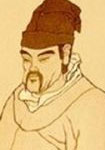栉感颠毛减
贫闲缘事少,老冷赖炉温。
草木千山麓,蓬茅数亩村。
相逢半农圃,无事理鸡豚。
落井吹鸣碓,横参对掩门。
人归邑犬吠,江黑夜虹翻。
栉感颠毛减,书愁病眼昏。
按方成小酿,征古构新文。
默喻乾坤意,静看魑魅奔。
何须叹虎兕,吾道古来尊。
栉感颠毛减。宋代。张耒。岁暮柯山客,萧条酒一樽。贫闲缘事少,老冷赖炉温。草木千山麓,蓬茅数亩村。相逢半农圃,无事理鸡豚。落井吹鸣碓,横参对掩门。人归邑犬吠,江黑夜虹翻。栉感颠毛减,书愁病眼昏。按方成小酿,征古构新文。默喻乾坤意,静看魑魅奔。何须叹虎兕,吾道古来尊。
《岁暮闲韵四首》是宋代张耒创作的一首诗词。以下是这首诗词的中文译文、诗意和赏析:
岁暮柯山客,
In the late year, a traveler on Ke Mountain,
萧条酒一樽。
Solitary and desolate, with only a cup of wine.
贫闲缘事少,
Poor and idle, with few worldly affairs,
老冷赖炉温。
Old and cold, relying on the warmth of the stove.
草木千山麓,
Grasses and trees cover the foot of a thousand mountains,
蓬茅数亩村。
A village of a few acres with thatched cottages.
相逢半农圃,
Meeting in a half-farmed field,
无事理鸡豚。
No concerns, just tending to chickens and pigs.
落井吹鸣碓,
Drawing water from a well, blowing the millstone,
横参对掩门。
Crossing the bamboo fence, facing the closed door.
人归邑犬吠,
As people return, village dogs bark,
江黑夜虹翻。
The river turns black, and a rainbow appears in the night.
栉感颠毛减,
Combing my hair, feeling the thinning strands,
书愁病眼昏。
Reading with a worried heart, my eyes grow dim.
按方成小酿,
Following the traditional method, brewing a small amount of wine,
征古构新文。
Exploring the ancient to create new literature.
默喻乾坤意,
Silently expressing the meaning of the universe,
静看魑魅奔。
Quietly observing the demons and spirits in a hurry.
何须叹虎兕,
Why bother lamenting tigers and rhinoceroses,
吾道古来尊。
My path has always been revered.
这首诗词以描绘岁末时节的景象为主题,通过描述柯山上一位贫困的旅行者的生活状态,表达了作者对于宁静、质朴生活的向往和追求。诗中的景物描写简洁而富有意境,通过对自然景物和日常琐事的描绘,展现了作者内心的孤独和淡泊。同时,诗中也透露出对于传统文化的尊重和对于创新的探索,表达了作者对于文学创作的思考和追求。
总的来说,这首诗词通过简洁而富有意境的描写,展现了作者对于宁静、质朴生活的向往,同时也表达了对于传统文化的尊重和对于创新的追求。
张耒
张耒(1054—1114年),字文潜,号柯山,亳州谯县(今安徽亳州市)人。北宋时期大臣、文学家,人称宛丘先生、张右史。代表作有《少年游》、《风流子》等。《少年游》写闺情离思,那娇羞少女的情态跃然纸上,让人羡煞爱煞,那份温情美妙真是有点“浓得化不开”。著有《柯山集》、《宛邱集》。词有《柯山诗余》。列为元佑党人,数遭贬谪,晚居陈州。...
张耒。张耒(1054—1114年),字文潜,号柯山,亳州谯县(今安徽亳州市)人。北宋时期大臣、文学家,人称宛丘先生、张右史。代表作有《少年游》、《风流子》等。《少年游》写闺情离思,那娇羞少女的情态跃然纸上,让人羡煞爱煞,那份温情美妙真是有点“浓得化不开”。著有《柯山集》、《宛邱集》。词有《柯山诗余》。列为元佑党人,数遭贬谪,晚居陈州。
